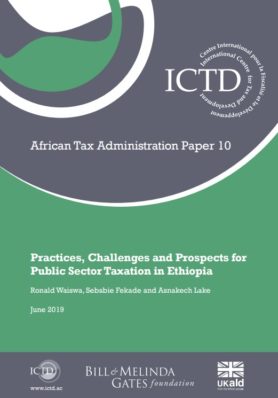African Tax Administration Paper 10
The tax compliance behaviour of the public sector has been largely neglected in the tax literature. Other than appearing in tax laws as taxpayers, in practice the compliance strategies employed by revenue authorities do not sufficiently cater to government agencies. Enforcement of tax payments on these agencies is generally perceived to be a difficult undertaking and of less value than other priorities. One strategy to improve tax compliance in the public sector has been to separate them from other taxpayers and to provide them with special treatment. This strategy has been employed in Uganda, where it has been reportedly quite successful, and in Nigeria, where there is currently limited empirical evidence to evaluate its success. This paper aims to explore the compliance level of the public sector in Ethiopia, the legal and administrative challenges at the Ethiopian Revenue and Customs Authority (ERCA) to effectively tax public sector entities, and to assess whether segmenting the public sector from other taxpayers would be a relevant strategy in Ethiopia. The study finds that the compliance level of the public sector is wanting, especially in regards to remitting withheld taxes to ERCA. The bottleneck appears to be caused primarily by administrative weaknesses and less by gaps in existing tax laws. This study finds a number of administrative inefficiencies related to ERCA’s taxation of public sector entities, including: (1) the perception that enforcing tax laws on the public sector is a hard or even impossible task; (2) a fragmented VAT withholding system; (3) malfunctioning e-filing and e-payment systems; (4) limited taxpayer sensitisation campaigns; (5) low levels of automation; and (6) unsatisfactory tax services rendered. From the perspective of public sector taxpayers themselves, the study also finds a number of factors that undermine compliance, including: (1) a lack of sufficient care and attention to tax obligations among managers; (2) the fact that some government entities use a single taxpayer identification number (TIN) for many branches makes it difficult to trace transactions; and (3) the lack of supportive actions from political leaders. The study recommends the creation of a decentralised office to administer public sector taxation, conditional on the strong support of leaders from the revenue authority as well as other key government officials.
